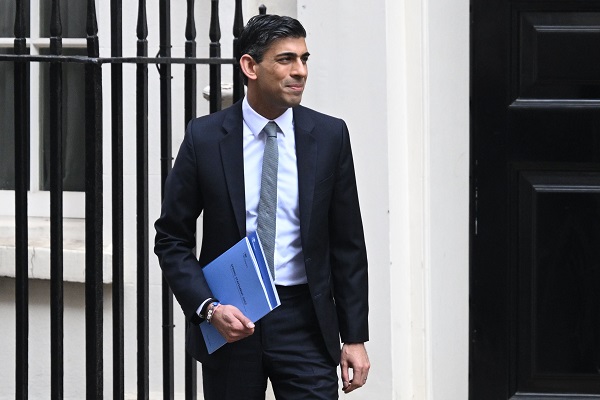The pros on why there’s signs the unloved UK will have its day
28th November 2022 11:17
by David Prosser from interactive investor
UK equity funds have been out of favour for a number of years, including in 2022, despite the FTSE 100 holding up well. But David Prosser reports that fund managers are spotting catalysts for a turnaround in fortunes.

It’s a lonely business running a UK equity fund these days. Data from global fund network Calastone reveals that £424 million flowed out of UK equity funds during October – the 17th successive month in which there were more sellers than buyers for these vehicles. Very few domestic and global investors, it seems, want much to do with the UK stock market right now.
There are some simple explanations for that, of course. October’s political turmoil was particularly tumultuous – with Liz Truss quitting as prime minister after less than 50 days in office – but it capped six long years of turbulence. Ever since the UK voted to leave the European Union, investors have been discounting UK stocks on the basis that they come with significant political volatility and uncertainty attached.
- Explore our: Interactive investor Offers | Top Investment Trusts | Transferring an Investment Account
Technical factors have played a part too. The UK stock market has for some time been heavily weighted towards cyclical and value shares – and short on the growth stocks that global investors were so attracted to for so long. For as long as growth remained the fashionable investment theme of the day, UK stocks were likely to be out of favour.
UK shares may have already priced in recession
On the face of it, there isn’t much room for a change of heart. Having just announced that the economy shrank in the third quarter of the year, the UK looks to be heading into a recession the Bank of England warns could last until 2023. The International Monetary Fund (IMF) thinks the UK will the weakest advanced economy in the world next year.
Nevertheless, it’s possible to argue markets have already priced in such downbeat economic news. And there are early signs that investors’ view of the UK might just be reaching a turning point. The UK’s political environment appears to have stabilised under Rishi Sunak’s leadership – and with a general election still two years away, there is potential for a period of calm.
As for style, global markets have in 2022 seen a shift towards value at the expense of technology companies, the ultimate growth stocks.
Indeed, while perceptions may be otherwise, the UK stock market has performed much more strongly this year, at least in relative terms. Data from JP Morgan Research shows that in dollar terms, UK equities were down 19.8% over the first 10 months of 2022. Clearly, that’s not great – but the US and the eurozone were off 24.1% and 31.3% over the same period.
- Fund managers are increasing cash rather than buying low
- Ten growth funds the pros have been sticking by despite style rotation
- Tips and tactics to help you build a portfolio
There is some tentative evidence that investors are beginning to notice this performance, which follows an extended period in which the UK market lagged its peers. The £424 million of investor withdrawals reported by Calastone in October was actually the lowest figure since March – and in the first few days of Sunak’s term in 10 Downing Street, the network registered inflows.
International investors sizing up the UK
Certainly, there are international investors who are beginning to look at the UK as a real opportunity. As Mislav Matejka, head of global equity strategy at JP Morgan, points out, the continuing weakness of sterling is a real positive for many larger UK companies. “Currency is an important driver of the FTSE 100’s relative performance because the index derives nearly 70% of its revenues from abroad,” he explains.
Matejka adds: “UK equities remain exceptionally attractively priced, trading at the lowest forward price to earnings ratios versus their global peers on record.”
Still, UK equities have been cheap for some time now. Is there a catalyst that might prompt international investors to start capitalising on that opportunity, rather than just talking about it?
Stephen Anness, manager of the Invesco Select Trust Global Equity Income Share Portfolio, thinks there are a couple of possibilities. First, he says of the Sunak administration: “A greater degree of political stability, and reduced government borrowing and spending will help; one of the best catalysts for change would be Britain becoming boring again.”
In addition, Anness thinks yield will be important, particularly if sterling can maintain the tentative recovery seen in recent weeks. “The UK is one of the highest yielding markets in the world and that has to be appealing to investors,” he says.
- The big risk fund managers are braced for in 2023
- Why now is not the time to sell out of funds
- Why I’m sticking with my racy growth portfolio
It also helps that the UK market offers the opportunity to diversify. He points out: “There are a lot of good, undervalued companies in the UK, many of which generate the bulk of their income overseas – such as Standard Chartered (LSE:STAN), which focuses heavily on Asia,” Anness says. “And there are good companies that should prove resilient in a recession. The biggest holding in our portfolio is the UK business 3i, which owns Action, the fastest growing non-food discount retailer in Europe.”
Simon Edelsten, who runs both the Mid Wynd International Investment Trust (LSE:MWY) and Artemis Global Select fund, also sees recession as a potential trigger for interest in certain parts of the market. “The UK has a range of fine listed companies; although few are global leaders with good pricing power, two that stand out are Diageo (LSE:DGE) and Unilever (LSE:ULVR),” he says.
“Both companies have shown that they can raise the prices of their products in response to higher costs in production and, particularly, distribution, leaving profitability maintained for shareholders.”

Rise in takeovers shows UK has plenty of value
Another potential catalyst for renewed exposure to UK funds could be rising levels of M&A activity, suggests Andy Brough, head of the pan-European small and mid-cap team at Schroders. Stock market investors are not the only ones to have spotted the UK’s valuation opportunity, he says.
“The recent pick-up in UK M&A is particularly focused on small and mid-cap companies,” Brough points out – these stocks are already outperforming their larger counterparts. That may prompt increasing interest in funds offering exposure to this part of the market.
None of which is to suggest that fund outflows are suddenly about to turn into whacking fund inflows. But the pick-up in UK market performance, even ahead of recession, will at least prick the interests of international investors – particularly those who believe in that old stock market adage, “the trend is your friend”.
Calling the bottom of the market is impossible, of course, but recent data from the Association of Investment Companies (AIC) makes interesting reading. It looked at money invested in the stock market via investment companies during and after each of the past three recessions to have hit the UK economy. In each case, it found that funds recovered all their losses and delivered positive returns within three years of the beginning of the recession.
Financial advisers counsel caution. “Many UK companies are trading at very low multiples and should be relatively attractive long term,” says Scott Gallacher, director of independent financial adviser Rowley Turton. “But for the UK market to start performing, there may need to be a significant improvement in either the fundamentals or investor sentiment towards the UK.”
Expect the latter before the former, but there are some signs that improvement is under way.
Three funds to consider if the UK returns to favour
Dzmitry Lipski, head of funds research at interactive investor, expects challenging market conditions to continue, and warns investors in UK funds to tread carefully. “A more balanced, all-cap approach with a focus on quality is key, rather than taking a bet on a growth or value style,” he says. On this basis, Lipski has three suggestions for those looking at the UK funds market.
“The ES R&M UK Recovery has a very well-diversified portfolio of almost 250 stocks, with one third of assets featuring in the largest constituents of the UK stock market. Hugh Sergeant, manager since its launch in 2008, has an impressive track record over three decades of investing. The fund invests in recovery stocks – good businesses that are currently experiencing below-normal profit levels that are depressing their valuations.
“Royal London Sustainable has a concentrated large-cap growth portfolio of around 40 stocks. The core of the portfolio consists of companies involved wholly or in part in the manufacturing of products, industrial processes or the provision of services associated with improving the environment and the enhancement of human health and safety.
“Diverse Income Trust (LSE:DIVI) can invest in UK companies of any size but has a bias towards medium-sized and smaller companies. This focus differentiates the trust from the crowd, as most other UK equity income funds and investment trusts tend to have higher weightings to large companies. Fund managers Gervais Williams and Martin Turner run a diversified portfolio of around 130 holdings.”
These articles are provided for information purposes only. Occasionally, an opinion about whether to buy or sell a specific investment may be provided by third parties. The content is not intended to be a personal recommendation to buy or sell any financial instrument or product, or to adopt any investment strategy as it is not provided based on an assessment of your investing knowledge and experience, your financial situation or your investment objectives. The value of your investments, and the income derived from them, may go down as well as up. You may not get back all the money that you invest. The investments referred to in this article may not be suitable for all investors, and if in doubt, an investor should seek advice from a qualified investment adviser.
Full performance can be found on the company or index summary page on the interactive investor website. Simply click on the company's or index name highlighted in the article.